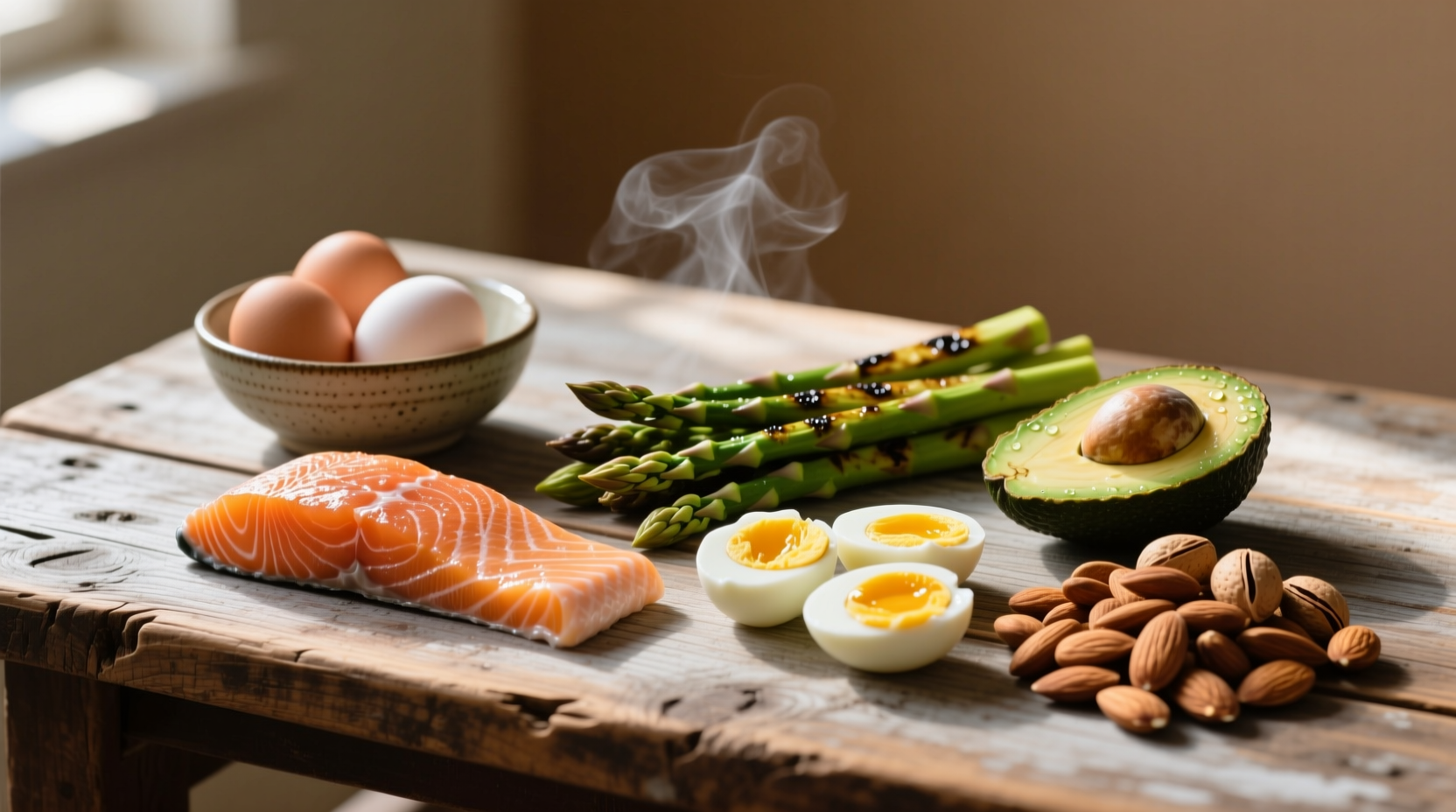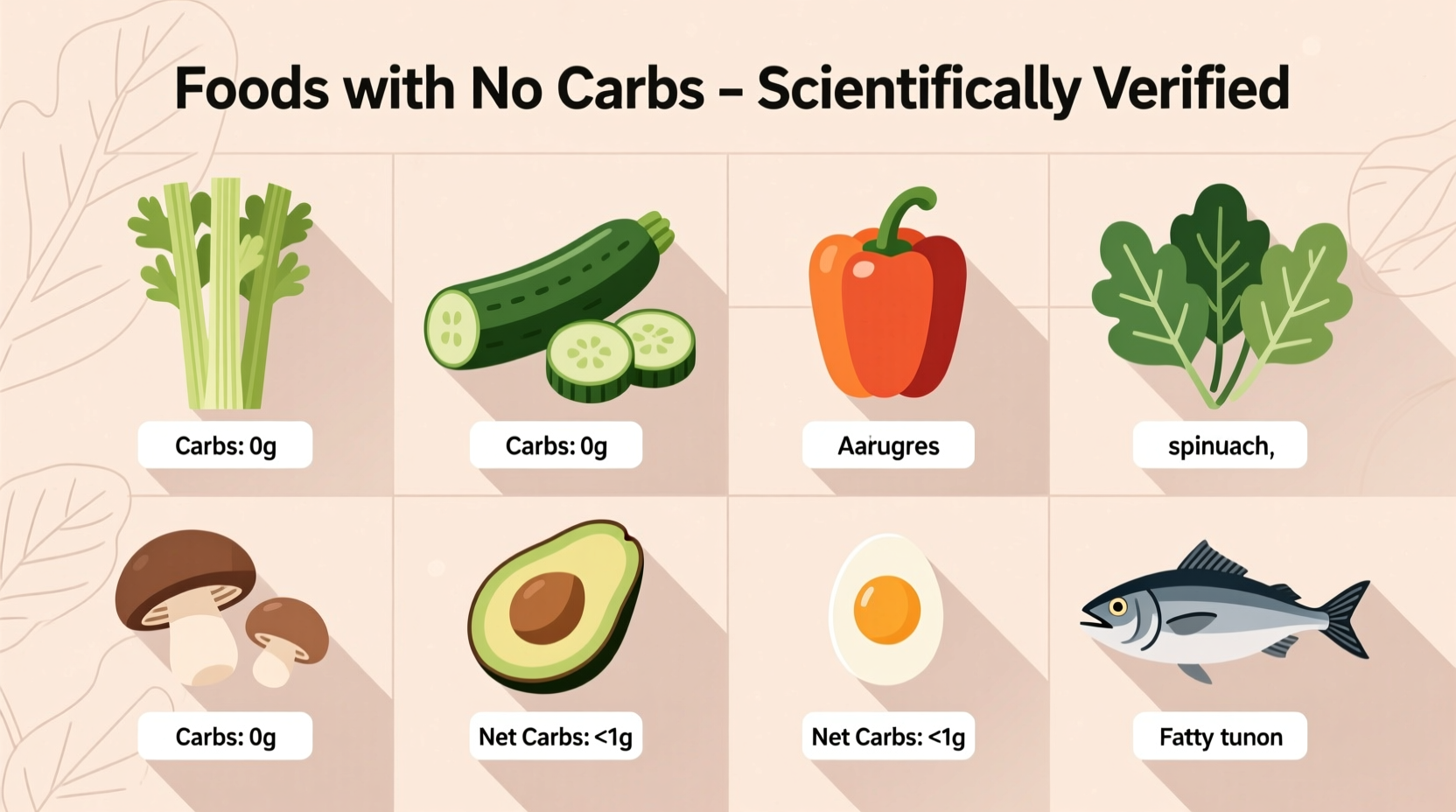Truly zero-carb foods are limited to pure animal fats and certain animal products. Only pure fats (like butter, lard, and oils) and unprocessed meats contain absolutely no carbohydrates. Most "zero carb" claims actually refer to foods with negligible carbs (<0.5g per serving), which are suitable for strict low-carb diets like keto when consumed in appropriate portions.
The Reality of Zero-Carb Foods: What You Need to Know
When searching for "what foods have no carbs," many people discover conflicting information. The truth is simple: very few foods contain absolutely zero carbohydrates. Understanding this distinction between "truly zero-carb" and "effectively zero-carb" foods is crucial for anyone following strict low-carb diets like keto, managing diabetes, or addressing metabolic health concerns.
According to USDA FoodData Central, the only foods containing absolutely zero carbohydrates are pure fats and oils. Even most animal products contain trace carbohydrates from glycogen stores. The U.S. Food and Drug Administration allows foods with less than 0.5g of carbs per serving to be labeled as "zero carbs" on nutrition facts, which explains much of the confusion.
Truly Zero-Carb Foods (0g Carbs)
These foods contain absolutely no carbohydrates:
- Pure fats and oils: Butter, ghee, lard, tallow, olive oil, coconut oil, avocado oil
- Unprocessed animal fats: Rendered bacon fat, duck fat
These items contain no water, protein, or carbohydrates—only pure fat. When purchasing these products, ensure they contain no additives, as many commercial versions include starches or other carb-containing ingredients.
Foods with Negligible Carbs (Effectively Zero for Dietary Purposes)
Most "zero carb" foods actually contain trace carbohydrates that are nutritionally insignificant for most low-carb diets. The following table shows foods with less than 0.5g of carbs per typical serving:
| Food | Typical Serving | Carbs (g) | Notes |
|---|---|---|---|
| Eggs | 1 large | 0.6 | Mostly in yolk; rounds to 0g on labels |
| Chicken breast | 3.5 oz (100g) | 0 | Raw; may contain traces when cooked |
| Salmon | 3.5 oz (100g) | 0 | Wild-caught has zero carbs |
| Beef steak | 3.5 oz (100g) | 0 | Unprocessed cuts only |
| Cheese (cheddar) | 1 oz | 0.4 | Rounds to 0g per FDA labeling rules |
Data sourced from USDA FoodData Central, the most authoritative nutritional database maintained by the U.S. Department of Agriculture. Note that cooking methods and processing can affect carb counts—for example, breaded meats or flavored oils will contain significant carbohydrates.

Common Misconceptions About Zero-Carb Foods
Many popular "zero carb" claims are misleading. Let's clarify some widespread myths:
- "All meats are zero carb" - While unprocessed meats are very low carb, they contain trace carbohydrates from animal glycogen. The amount varies by species and cut.
- "Eggs have zero carbs" - A large egg contains approximately 0.6g of carbs, but this rounds down to 0g on nutrition labels per FDA regulations.
- "Sea salt and spices have no carbs" - Most pure spices contain negligible carbs, but many commercial spice blends include anti-caking agents with carbohydrates.
The American Diabetes Association confirms that for meal planning purposes, foods with less than 5g of carbs per serving can be considered "low carb," while those under 0.5g are effectively carb-free for strict dietary protocols.
Practical Implementation Guide
Successfully incorporating zero and negligible-carb foods into your diet requires attention to detail:
- Read labels carefully: Look for hidden carbs in processed versions of otherwise low-carb foods (e.g., flavored oils, seasoned meats)
- Track portions: While individual servings may be negligible, cumulative carbs can add up
- Consider preparation methods: Grilling without marinades preserves zero-carb status; frying in breading adds significant carbs
- Watch for cross-contamination: Using the same cutting board for vegetables and meats can transfer small amounts of carbs
For those following therapeutic ketogenic diets (typically 20-50g net carbs daily), focusing on whole, unprocessed animal products and pure fats provides the most reliable zero-carb options. The National Institutes of Health notes that strict adherence to very low-carb protocols requires careful attention to these details for optimal metabolic results.
Special Considerations for Different Dietary Needs
Your approach to zero-carb foods should vary based on your specific health goals:
- Keto dieters: Focus on high-fat animal products to maintain adequate fat intake while keeping carbs negligible
- Diabetes management: Pair zero-carb proteins with non-starchy vegetables for balanced blood sugar control
- General health: Incorporate some low-carb vegetables for fiber and micronutrients while maintaining minimal carb intake
Registered dietitians at the Academy of Nutrition and Dietetics emphasize that while zero-carb foods can be part of healthy eating patterns, they should be complemented with nutrient-dense options to prevent potential deficiencies in fiber, vitamins, and minerals.
Frequently Asked Questions
Do eggs have zero carbs?
A large egg contains approximately 0.6g of carbohydrates, primarily in the yolk. However, the U.S. Food and Drug Administration allows foods with less than 0.5g of carbs per serving to be labeled as "zero carbs" on nutrition facts, which is why eggs are often considered zero-carb for dietary purposes.
Can I eat cheese on a zero-carb diet?
Most hard cheeses like cheddar contain about 0.4g of carbs per ounce, which qualifies as "zero carbs" under FDA labeling regulations. However, soft cheeses and processed cheese products often contain higher carb levels from added ingredients, so always check nutrition labels carefully.
Are there any zero-carb vegetables?
No vegetables contain absolutely zero carbohydrates. Even the lowest-carb vegetables like spinach and lettuce contain small amounts (1-3g per cup). For strict zero-carb requirements, vegetables should be avoided as they all contain some carbohydrates, though many are suitable for low-carb diets in appropriate portions.
Does cooking affect the carb content of zero-carb foods?
Cooking pure fats or unprocessed meats doesn't add carbohydrates, but preparation methods can. For example, grilling plain steak maintains zero carbs, while pan-frying in a beer-based batter adds significant carbohydrates. Always consider marinades, rubs, and cooking mediums when evaluating carb content.











 浙公网安备
33010002000092号
浙公网安备
33010002000092号 浙B2-20120091-4
浙B2-20120091-4